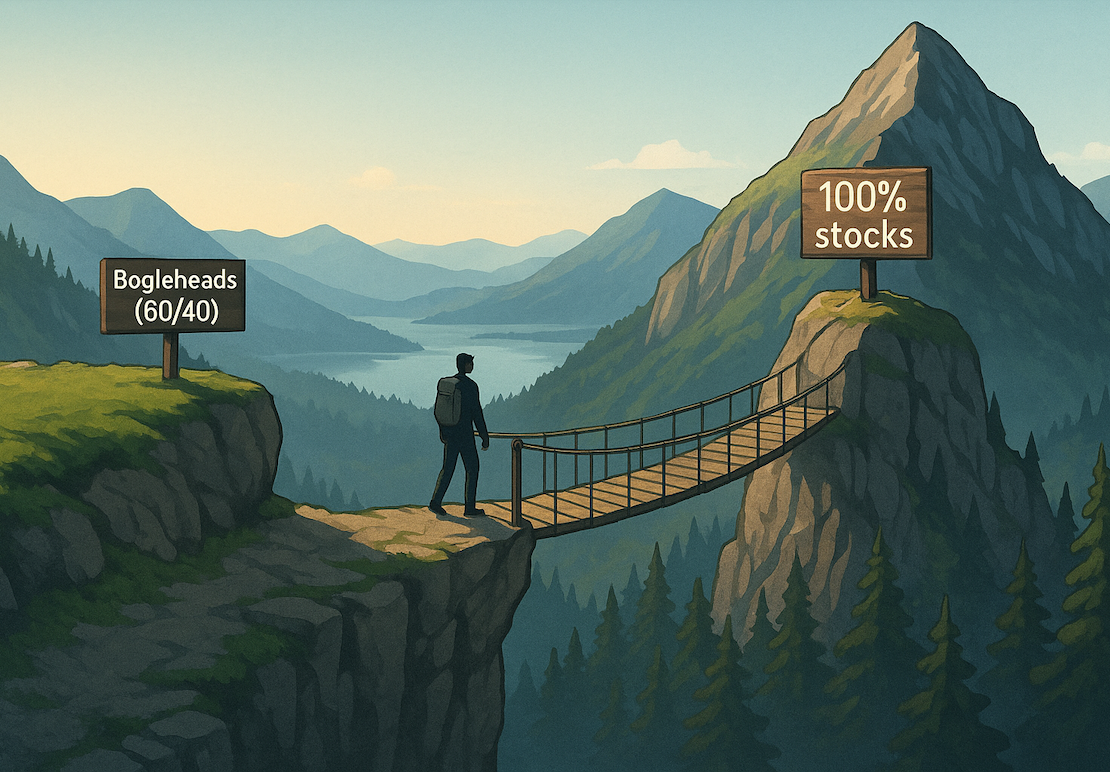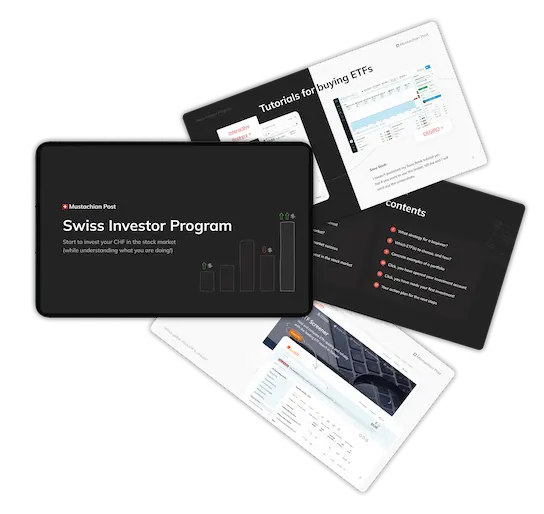Finally we get there for the first time on mustachianpost.com!
I spent one year investing on the market with a portfolio that I built months ago and that I didn’t change so far.
So today is the yearly update day where I check my situation against my goals and see whether a portfolio adaption is required or not.
Also, I will use this opportunity to check if there are better options that could bring in more wealth on the long run.
My actual stocks and bonds portfolio
In case you don’t know how I allocated my savings in 2014, below is a short reminder:
| ETF | ISIN | Symbol | Percentage of portfolio |
|---|---|---|---|
| iShares Core CHF Corporate Bond (CH) | CH0226976816 | CHCORP | 50% |
| iShares Swiss Domestic Government Bond 7-15 (CH) A | CH0016999861 | CSBGC0 | 20% |
| iShares SMI (CH) A | CH0008899764 | CSSMI | 10% |
| iShares MSCI World CHF Hedged UCITS ETF | IE00B8BVCK12 | IWDC | 20% |
The percentages are combined in a way that this portfolio supports my goals and particularly the one that is to buy our home in approximately two years.
Some of you may wonder why I’m choosing ETFs that are hedged as they cost more. Weird on a so-called frugal blog, isn’t it?
Well, actually, there is a good reason to that: as I live in Switzerland with its very own currency, the Swiss Franc (aka. CHF), and that I want to have a diversified portfolio so to not have all my money invested within my country only, I hereby must invest in companies abroad, hence in foreign currencies.
Unfortunately, the currency market isn’t what we can call a stable place. Even more during the last decade where the CHF got in troubles and that the Swiss National Bank had to introduce a floor rate.
As I plan to withdraw all my investments in the short-term (i.e. in less than five years), I must get a protection on these savings. I will get rid off this insurance as soon as our home is bought because afterwards, we are going to invest for the long run where hedging doesn’t bring you any extra security.
Investment opportunities for 2015
Thanks to some of you who took time to comment my previous article on the topic, I checked new options that could apply to my situation.
What about buying some “UBS ETF (CH) - SMI (CHF) (CHF) A-dis” (ISIN = CH0017142719) instead of my current “iShares SMI (CH) A (CH0008899764)"?
That good point led me to find out that UBS reduced its TER some months ago (sorry but I can’t find the article where I read about it) and that almost all their ETFs are now lower than those of iShares. This UBS ETF for instance has a TER of 0.20% while my current iShares has one of 0.35%.
On the other hand, there are three reasons that force me to stick with iShares until we buy our home:
- iShares has double the fund size compared to UBS as of today (~CHF 1.5 million of difference).
- The average buy volume of iShares is thrice superior than the one of UBS. This means that on the same period of time, people buy three times more ETFs from iShares than from UBS.
- Bid/ask spread of iShares is lower than the one from UBS, which indicates that transactions will be easier.
Imagine the EUR/CHF currency rate is 1 euro = CHF 1.20 and that BCV is selling it at CHF 1.22 and buying it at CHF 1.18 while UBS would sell it at CHF 1.235 and buy it at 1.16.
You would choose to deal with BCV, right? So would I ;)
As I plan to withdraw all my invested money in the next two-three years to come, even a TER difference of 0.15% isn’t enough to make me switch my SMI ETF tracker as when I will need to sell, all the three exposed points above will support me to do it quickly and with the less loss possible.
As always with the market, everything is depending on your situation. Once our home will be acquired, I will definitely go for the UBS ETF for my long-run investments. But for now, I’ll stick with iShares.
And what do you think about “iShares Core SPI (CH) (CH0237935652)" with a very low TER (0.10%)?
Although its TER sounds interesting, the fund size isn’t that big - lower than CHF 1 billion.
From what I learnt recently from a friend in the financial field, these ETFs have more chances to be cancelled or merged, leading to fees for the end customer.
I then decided to not purchase this ETF.
A last one that could let you be exposed to some more risks but also more opportunities to make money: “iShares Global High Yield Corp Bond CHF Hedged UCITS ETF (IE00B988C465)"?
On the advice of my friend from the financial field, this ETF should bring some good yield with a moderate risk.
I want to try at least one new thing in 2015 with my portfolio and I chose this junk bond so to see how it behaves during the upcoming year.
I will keep its impact low anyway by allowing it only 10% of my savings.
My new portfolio for 2015
This how my investment portfolio will look like for the 2015 year:
| ETF | ISIN | Symbol | Percentage of portfolio |
|---|---|---|---|
| iShares Core CHF Corporate Bond (CH) | CH0226976816 | CHCORP | 40% |
| iShares Swiss Domestic Government Bond 7-15 (CH) A | CH0016999861 | CSBGC0 | 20% |
| iShares Global High Yield Corp Bond CHF Hedged UCITS | IE00B988C465 | GHYC | 10% |
| iShares SMI (CH) A | CH0008899764 | CSSMI | 10% |
| iShares MSCI World CHF Hedged UCITS ETF | IE00B8BVCK12 | IWDC | 20% |
I didn’t understand one year ago why there wasn’t one rule that rules it all in the investment world.
But last year was full of readings which helped me get the most important point: it all depends what your situation and future plans are.
Once you know that, the rest is quite easy to figure out thanks to all online resources available.
On your side, what situation led you to to which portfolio for 2015?





Last updated: January 12, 2015